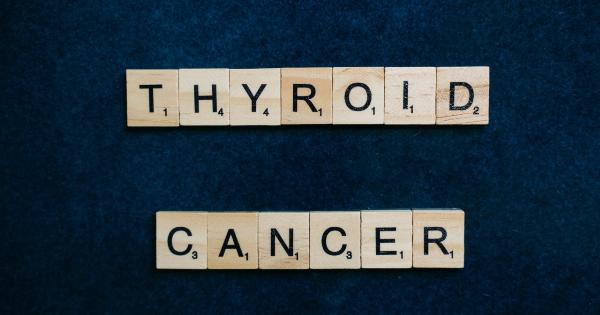The thyroid is a small butterfly-shaped gland located in the neck, responsible for producing hormones that control the body’s metabolism. When the cells in the thyroid gland grow uncontrollably, they can form small lumps called thyroid nodules.
The majority of thyroid nodules are benign (non-cancerous), but a small percentage can be cancerous.
Causes of Thyroid Nodules
The exact cause of thyroid nodules is unknown, but there are several factors that can increase the risk of developing them, including:.
- Iodine deficiency: A diet low in iodine can increase the likelihood of developing thyroid nodules.
- Age: The risk of developing thyroid nodules increases as you get older.
- Gender: Women are more likely to develop thyroid nodules than men.
- Family history: If there is a history of thyroid nodules or thyroid cancer in your family, you may be at a higher risk for developing them.
Symptoms of Thyroid Nodules
In most cases, thyroid nodules do not cause any symptoms. They are often discovered during a routine physical exam or imaging test, such as an ultrasound. However, some people may experience symptoms such as:.
- Difficulty swallowing: Large thyroid nodules can make it difficult to swallow or breathe.
- Hoarseness: If a nodule is located near the vocal cords, it can cause hoarseness.
- Pain: Some people with thyroid nodules may experience pain or discomfort in the neck.
- Hyperthyroidism: In rare cases, thyroid nodules can produce too much thyroid hormone, leading to hyperthyroidism. Symptoms of hyperthyroidism can include weight loss, rapid heartbeat, anxiety, and difficulty sleeping.
Diagnosis of Thyroid Nodules
If your doctor suspects you have a thyroid nodule, they may order one or more tests to diagnose it, including:.
- Ultrasound: This imaging test uses sound waves to create images of the thyroid gland and nodules.
- Biopsy: A small sample of tissue is removed from the nodule and examined under a microscope to determine if it is cancerous or benign.
- Blood tests: Blood tests can check for abnormal levels of thyroid hormones or thyroid-stimulating hormone (TSH).
Treatment of Thyroid Nodules
The treatment for thyroid nodules depends on several factors, including the size and type of the nodule, as well as the presence or absence of cancerous cells. Treatment options may include:.
- Watchful waiting: If the nodule is small and not causing any symptoms, your doctor may recommend monitoring it with regular ultrasounds and exams.
- Thyroid hormone therapy: If the nodule is producing too much thyroid hormone, your doctor may prescribe medications to regulate hormone levels.
- Radioactive iodine therapy: This treatment involves taking a small amount of radioactive iodine that is absorbed by the thyroid gland, which can shrink some types of nodules.
- Surgery: If the nodule is large or cancerous, surgery may be necessary to remove all or part of the thyroid gland.
Prevention of Thyroid Nodules
There is no guaranteed way to prevent thyroid nodules, but there are steps you can take to reduce the risk, including:.
- Eating a balanced diet: Include foods rich in iodine, such as seafood, dairy products, and iodized salt.
- Getting enough rest: Proper rest and sleep can help reduce stress levels, which can negatively impact the thyroid gland.
- Checking your neck for lumps: If you notice any lumps or swelling in your neck, contact your doctor for an evaluation.
Conclusion
Thyroid nodules are common and are usually not cancerous. However, if you experience any symptoms or notice any lumps in your neck, it is important to see your doctor for an evaluation.
Early detection and treatment can help prevent complications and improve outcomes.


























